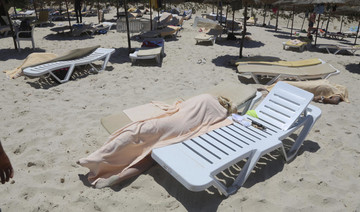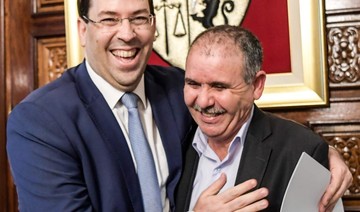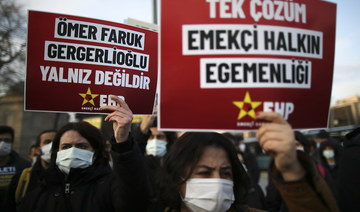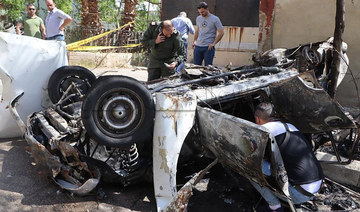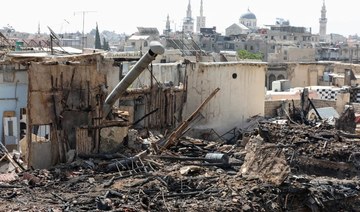TUNIS: A Tunisian court has sentenced seven extremists to life in prison over attacks at a museum and on a beach in 2015 that killed 60 people, many of them British tourists, prosecutors said on Saturday.
Dozens of defendants faced two separate trials over the closely linked shootings, which occurred just months apart in Tunis and Sousse, but many were acquitted.
Four were sentenced to life in prison for the shooting rampage at a Sousse tourist resort in June 2015, which killed 38 people, mostly British tourists.
Five other defendants in the Sousse case were handed jail terms ranging from six months to six years, while 17 were acquitted, prosecution spokesman Sofiene Sliti said.
Three were given life sentences for the earlier attack in March 2015 at the capital’s Bardo National Museum, in which two gunmen killed 21 foreign tourists and a Tunisian security guard.
Others found guilty of links to the Bardo attack were sentenced to prison terms ranging from one to 16 years, and a dozen defendants were acquitted, Sliti said.
The prosecution will appeal, he added.
One of the lawyers for relatives of French victims in the Bardo attack, Gerard Chemla, expressed “enormous bitterness” that the families had not been given more input into the proceedings.
He said a live feed of Friday’s hearing had brought some degree of comfort but lamented that the relatives of those killed had not been compensated.
Geraldine Berger-Stenger, another of the lawyers, said the hearings had not revealed the full truth of what took place.
“A page has turned, but this isn’t a trial that can satisfy the victims,” she said. “There is a taste of unfinished business.”
Tunisia retains the death penalty for terrorism offenses despite carrying out no executions since the 1990s.
The court heard that the two attacks, both claimed by Daesh, were closely linked.
Several defendants pointed to the fugitive Chamseddine Sandi as mastermind of both.
According to Tunisian media, Sandi was killed in a US air strike in neighboring Libya in February 2016, although there has been no confirmation.
Among those who were facing trial were six security personnel accused of failing to provide assistance to people in danger during the Sousse attack.
That shooting was carried out by Seifeddine Rezgui, who opened fire on a beach before rampaging into a high-end hotel, where he continued to fire a kalashnikov and throw grenades until being shot dead by police.
Four French nationals, four Italians, three Japanese and two Spaniards were among those killed in the Bardo attack, before the two gunmen, armed with Kalashnikov assault rifles, were themselves shot dead.
Investigations showed one of the gunmen, Yassine Laabidi — who was born in 1990 and was from a poor district near Tunis — had amphetamines in his body.
His fellow attacker Jaber Khachnaoui, born in 1994 and from Tunisia’s deprived Kasserine region, had traveled to Syria in December 2014 via Libya.
One suspect questioned in court, Tunis laborer Mahmoud Kechouri, said he had helped plan the Bardo attack, including preparing mobile phones for Sandi, a neighbor and longtime friend.
Kechouri, 33, said he was driven by a “duty to participate in the emergence of the caliphate,” that Daesh supremo Abu Bakr Al-Baghdadi proclaimed in June 2014 across swathes of territory the militants controlled in Iraq and neighboring Syria.
Other defendants accused of helping prepare the attack said they had only discussed ideas with friends. Several alleged they were tortured in detention.
Survivors and relatives in France and Belgium, who watched the live feed of Friday’s hearing, said it had helped them to turn the page.
“It was important for us to see, and especially to hear — to try to understand the role” of each defendant, said one French survivor.
“Arriving at the end of the process will help us to turn the page, even if we can never forget.”
The Sousse attack, which killed 30 Britons, is also the subject of proceedings in front of the Royal Courts of Justice in London, which is seeking to establish what happened.
After holding inquests into the British deaths in January and February 2017, judge Nicholas Loraine-Smith concluded that the response of Tunisian police was “at best shambolic, at worst cowardly.”
There have been significant improvements in security at Tunisian tourist resorts since the massacre and, in July 2017, Britain lifted its warning against “all but essential travel” to the North African country.
The attacks and resulting travel warnings dealt a devastating blow to Tunisia’s vital tourism sector from which it has taken time to recover.
Since a 2011 uprising that toppled dictator Zine El Abidine Ben Ali, militant attacks in Tunisia have killed dozens of members of the security forces.
Thousands of Tunisians have also traveled abroad to join extremist organizations, according to the United Nations.
Tunisian court sentences seven terrorists to life for deadly 2015 attacks
Tunisian court sentences seven terrorists to life for deadly 2015 attacks
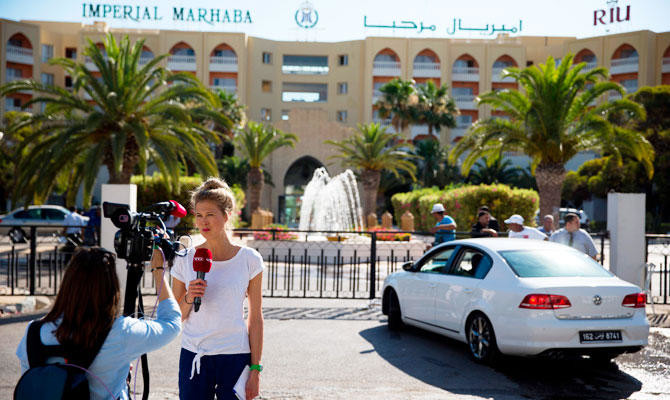
- A Tunisian court has sentenced seven terrorists to life in prison over attacks at a museum and on a beach in 2015 that left dozens of tourists dead
- Two separate trials were held over the closely linked attacks which occurred just months apart in Tunis and Sousse
Israel builds ‘cyber dome’ against Iran’s hackers

- Israeli cybersecurity agency had thwarted around 800 significant attacks since the Oct. 7 Gaza war erupted
- But some attacks could not be foiled, including against hospitals in which patient data was stolen
TEL AVIV: Israel’s Iron Dome defense system has long shielded it from incoming rockets. Now it is building a “cyber dome” to defend against online attacks, especially from arch foe Iran.
“It is a silent war, one which is not visible,” said Aviram Atzaba, the Israeli National Cyber Directorate’s head of international cooperation.
While Israel has fought Hamas in Gaza since the October 7 attack, it has also faced a significant increase in cyberattacks from Iran and its allies, Atzaba said.
“They are trying to hack everything they can,” he told AFP, pointing to Hamas and Lebanon’s Hezbollah movement but adding that so far “they have not succeeded in causing any real damage.”
He said around 800 significant attacks had been thwarted since the war erupted. Among the targets were government organizations, the military and civil infrastructure.
Some attacks could not be foiled, including against hospitals in the cities of Haifa and Safed in which patient data was stolen.
While Israel already has cyber defenses, they long consisted of “local efforts that were not connected,” Atzaba said.
So, for the past two years, the directorate has been working to build a centralized, real-time system that works proactively to protect all of Israeli cyberspace.
Based in Tel Aviv, the directorate works under the authority of the prime minister. It does not reveal figures on its staff, budget or computing resources.
Israel collaborates closely with multiple allies, including the United States, said Atzaba, because “all states face cyber terrorism.”
“It takes a network to fight a network,” he said.
Israel’s arch foe Iran is “an impressive enemy” in the online wars, said Chuck Freilich, a researcher at the Institute for National Security Studies, which is affiliated with Tel Aviv University.
“Its attacks aim to sabotage and destroy infrastructure, but also to collect data for intelligence and spread false information for propaganda purposes,” he said.
Iran has welcomed Hamas’s October 7 attack on Israel, which resulted in the deaths of 1,170 people, mostly civilians, according to an AFP tally based on Israeli official figures.
Israel’s retaliatory offensive against Hamas has killed at least 34,596 people in Gaza, mostly women and children, according to the Hamas-run territory’s health ministry.
Regional tensions have soared, particularly after Iran for the first time fired hundreds of missiles directly at Israel last month in retaliation for a deadly Israeli air strike on the Iranian consulate in Damascus.
It was the most dramatic escalation yet after a years-long shadow war of killings and sabotage attacks between Israel and Iran.
Freilich argued in a study published in February that Iran was relatively slow to invest in cyberwarfare, until two key events triggered a change.
First, its leaders took note of how anti-government protesters used the Internet as a tool to mobilize support for a 2009 post-election uprising.
In the bloody crackdown that crushed the movement, Iran’s authorities cut access to social media and websites covering the protests.
Then, in September 2010, a sophisticated cyberattack using the Stuxnet virus, blamed by Iran on Israel and the United States, caused physical damage to Tehran’s nuclear program.
Freilich said the attack “demonstrated Iran’s extreme vulnerability and led to a severe national shock.”
Since then, Iran has gained substantial expertise to become “one of the most active countries in cyberspace,” he said
While Israel is considered a major cyber power, Iran was only likely to improve, said Freilich.
He pointed to assistance from Russia and China, as well as its much larger population and an emphasis on cyber training for students and soldiers alike, adding that the trend was “concerning for the future.”
Atzaba insisted that the quantity of hackers is secondary to the quality of technology and the use it is put to.
“For the past two years, we have been developing a cyber dome against cyberattacks, which functions like the Iron Dome against rockets,” he said.
“With cyber dome, all sources are fed into a large data pool that enables a view of the big picture and to invoke a national response in a comprehensive and coordinated manner.”
The Israeli system has various scanners that continuously “monitor Israeli cyberspace for vulnerabilities and informs the stakeholders of the means to mitigate them,” he said.
Israel’s cyber strength relied on close cooperation between the public, private and academic sectors, as well as Israel’s “white hat” hackers who help identify weaknesses.
“We work hand in hand,” he said.
Kurds deny torturing detainees in north Syria camps
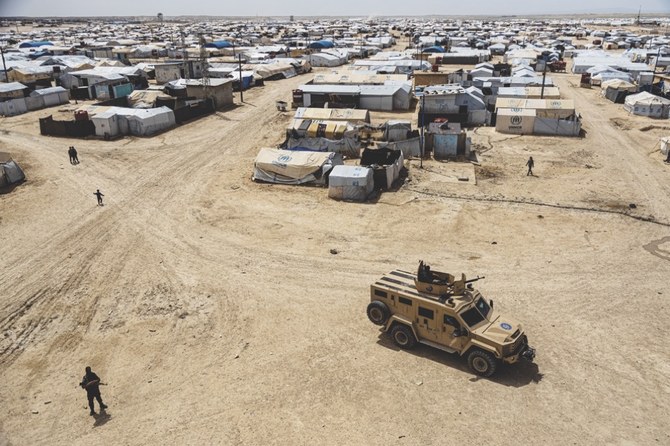
- Rights group alleges cruelty against Daesh militant prisoners and their families
JEDDAH: Kurdish authorities in northeast Syria on Thursday denied claims by Amnesty International that they tortured Daesh militants and their dependents detained in internment camps.
More than 56,000 prisoners with links to the Islamist militant group are still being held five years after Daesh were driven out of their last territory in Syria. They include militants locked up in prisons, and Daesh fighters’ wives and children in Al-Hol and Roj camps.
Amnesty secretary general Agnes Callamard said Kurdish authorities had “committed the war crimes of torture and cruel treatment, and probably committed the war crime of murder.”
The semi-autonomous Kurdish administration in northeast Syria said it “respects its obligations to prevent the violation of its laws, which prohibit such illegal acts, and adheres to international law.”
Any such crimes that may have been perpetrated were “individual acts,” it said, and asked Amnesty to provide it with any evidence of wrongdoing by its security forces and affiliates.
“We are open to cooperating with Amnesty International regarding its proposed recommendations, which require concerted regional and international efforts,” it said.
Kurdish authorities said they had repeatedly asked the international community for help in managing the camps, which required “huge financial resources.”
Al-Hol is the largest internment camp in northeast Syria, with more than 43,000 detainees from 47 countries, most of them women and children related to Daesh fighters.
Hamas is sending a delegation to Egypt for further ceasefire talks in the latest sign of progress

- US and Egyptian mediators have put to Hamas a proposal -– apparently with Israel’s acceptance — that sets out a three-stage process that would bring an immediate six-week ceasefire and partial release of Israeli hostages
BEIRUT: Hamas said Thursday that it was sending a delegation to Egypt for further ceasefire talks, in a new sign of progress in attempts by international mediators to hammer out an agreement between Israel and the militant group to end the war in Gaza.
After months of stop-and-start negotiations, the ceasefire efforts appear to have reached a critical stage, with Egyptian and American mediators reporting signs of compromise in recent days. But chances for the deal remain entangled with the key question of whether Israel will accept an end to the war without reaching its stated goal of destroying Hamas.
The stakes in the ceasefire negotiations were made clear in a new UN report that said if the Israel-Hamas war stops today, it will still take until 2040 to rebuild all the homes that have been destroyed by nearly seven months of Israeli bombardment and ground offensives in Gaza. It warned that the impact of the damage to the economy will set back development for generations and will only get worse with every month fighting continues.
The proposal that US and Egyptian mediators have put to Hamas -– apparently with Israel’s acceptance — sets out a three-stage process that would bring an immediate six-week ceasefire and partial release of Israeli hostages, but also negotiations over a “permanent calm” that includes some sort of Israeli withdrawal from Gaza, according to an Egyptian official. Hamas is seeking guarantees for a full Israeli withdrawal and complete end to the war.
Hamas officials have sent mixed signals about the proposal in recent days. But on Thursday, its supreme leader, Ismail Haniyeh, said in a statement that he had spoken to Egypt’s intelligence chief and “stressed the positive spirit of the movement in studying the ceasefire proposal.”
The statement said that Hamas negotiators would travel to Cairo “to complete the ongoing discussions with the aim of working forward for an agreement.” Haniyeh said he had also spoken to the prime minister of Qatar, another key mediator in the process.
The brokers are hopeful that the deal will bring an end to a conflict that has killed more than 34,000 Palestinians, according to local health officials, caused widespread destruction and plunged the territory into a humanitarian crisis. They also hope a deal will avert an Israeli attack on Rafah, where more than half of Gaza’s 2.3 million people have sought shelter after fleeing battle zones elsewhere in the territory.
If Israel does agree to end the war in return for a full hostage release, it would be a major turnaround. Since Hamas’ Oct. 7 attack stunned Israel, its leaders have vowed not to stop their bombardment and ground offensives until the militant group is destroyed. They also say Israel must keep a military presence in Gaza and security control after the war to ensure Hamas doesn’t rebuild.
Publicly at least, Israeli Prime Minister Benjamin Netanyahu continues to insist that is the only acceptable endgame.
He has vowed that even if a ceasefire is reached, Israel will eventually attack Rafah, which he says is Hamas’ last stronghold in Gaza. He repeated his determination to do so in talks Wednesday with US Secretary of State Antony Blinken, who was in Israel on a regional tour to push the deal through.
The agreement’s immediate fate hinges on whether Hamas will accept uncertainty over the final phases to bring the initial six-week pause in fighting — and at least postpone what it is feared would be a devastating assault on Rafah.
Egypt has been privately assuring Hamas that the deal will mean a total end to the war. But the Egyptian official said Hamas says the text’s language is too vague and wants it to specify a complete Israeli pullout from all of Gaza. The official spoke on condition of anonymity to talk about the internal deliberations.
On Wednesday evening, however, the news looked less positive as Osama Hamdan, a top Hamas official, expressed skepticism, saying the group’s initial position was “negative.” Speaking to Hezbollah’s Al-Manar TV, he said that talks were still ongoing but would stop if Israel invades Rafah.
Blinken hiked up pressure on Hamas to accept, saying Israel had made “very important” compromises.
“There’s no time for further haggling. The deal is there,” Blinken said Wednesday before leaving for the US
An Israeli airstrike, meanwhile, killed at least five people, including a child, in Deir Al-Balah in central Gaza. The bodies were seen and counted by Associated Press journalists at a hospital.
The war broke out on Oct. 7. when Hamas militants broke into southern Israel and killed over 1,200 people, mostly Israelis, taking around 250 others hostage, some released during a ceasefire on November.
The Israel-Hamas war was sparked by the Oct. 7 raid into southern Israel in which militants killed around 1,200 people, mostly civilians, and abducted around 250 hostages. Hamas is believed to still hold around 100 hostages and the remains of more than 30 others.
Since then, Israel’s campaign in Gaza has wreaked vast destruction and brought a humanitarian disaster, with several hundred thousand Palestinians in northern Gaza facing imminent famine, according to the UN More than 80 percent of the population has been driven from their homes.
The “productive basis of the economy has been destroyed” and poverty is rising sharply among Palestinians, according to the report released Thursday by the United Nations Development Program and the Economic and Social Commission for Western Asia.
It said that in 2024, the entire Palestinian economy — including both Gaza and the West Bank -– has so far contracted 25.8 percent. If the war continues, the loss will reach a “staggering” 29 percent by July, it said. The West Bank economy has been hit by Israel’s decision to cancel the work permits for tens of thousands of laborers who depended on jobs inside Israel.
“These new figures warn that the suffering in Gaza will not end when the war does,” UNDP administrator Achim Steiner said. He warned of a “serious development crisis that jeopardizes the future of generations to come.”
Syria says Israeli strike outside Damascus injures eight troops
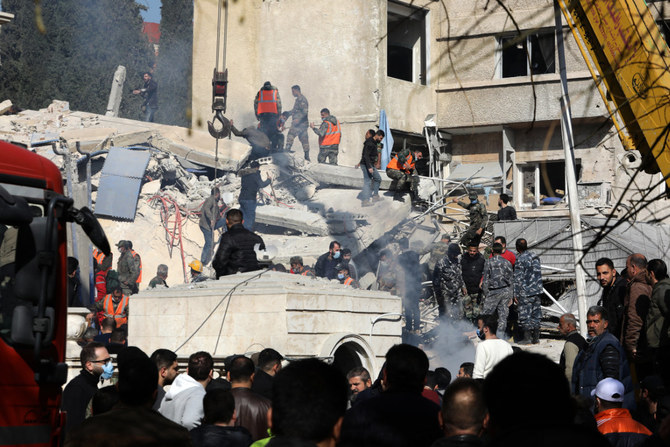
- A security source said the strike hit a building operated by government forces
- Defense ministry acknowledged only that the strike caused some material damage
An Israeli airstrike on the outskirts of Damascus injured eight Syrian military personnel late on Thursday, the Syrian defense ministry said, the latest such attack amid the war in Gaza.
The Israeli strike, launched from the occupied Golan Heights toward “one of the sites in the vicinity of Damascus,” caused some material damage, the Syrian defense ministry said in a statement.
The strike hit a building operated by Syrian security forces, a security source in the alliance backing Syria’s government earlier told Reuters.
The Israeli military said it does not comment on reports in the foreign media.
Israel has for years been striking Iran-linked targets in Syria and has stepped up its campaign in the war-torn country since Oct. 7, when Iran-backed Palestinian militants Hamas crossed into Israeli territory in an attack that left 1,200 people dead and led to more than 250 taken hostage.
Israel responded with a land, air and sea assault on the Gaza Strip, escalated strikes on Syria and exchanged fire with Lebanese armed group Hezbollah across Lebanon’s southern border.
The security source said the location struck in Syria on Thursday sat just south of the Sayyeda Zeinab shrine, where Hezbollah and Iranian forces are entrenched.
But the source said the site struck was not operated by Iranian units or Hezbollah.
Turkiye halts all trade with Israel, cites worsening Palestinian situation

- Turkiye’s trade ministry: ‘Export and import transactions related to Israel have been stopped, covering all products’
- Israel’s FM Israel Katz said that Turkish President Tayyip Erdogan was breaking agreements by blocking ports to Israeli imports and exports
ANKARA: Turkiye stopped all exports and imports to and from Israel as of Thursday, the Turkish trade ministry said, citing the “worsening humanitarian tragedy” in the Palestinian territories.
“Export and import transactions related to Israel have been stopped, covering all products,” Turkiye’s trade ministry said in a statement.
“Turkiye will strictly and decisively implement these new measures until the Israeli Government allows an uninterrupted and sufficient flow of humanitarian aid to Gaza.”
The two countries had a trade volume of $6.8 billion in 2023.
Turkiye last month imposed trade restrictions on Israel over what it said was Israel’s refusal to allow Ankara to take part in aid air-drop operations for Gaza and its offensive on the enclave.
Earlier on Thursday, Israel’s foreign minister said that Turkish President Tayyip Erdogan was breaking agreements by blocking ports to Israeli imports and exports.
“This is how a dictator behaves, disregarding the interests of the Turkish people and businessmen, and ignoring international trade agreements,” Israel’s Foreign Minister Israel Katz posted on X.
Katz said he instructed the foreign ministry to work to create alternatives for trade with Turkiye, focusing on local production and imports from other countries.


